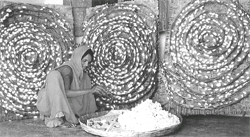Silk route to success
 the image of the Indian rural woman is changing. No more the stereotyped demure wife, she is searching for her own identity and cautiously trying to come out of the shadows of the patriarchs in her family.
the image of the Indian rural woman is changing. No more the stereotyped demure wife, she is searching for her own identity and cautiously trying to come out of the shadows of the patriarchs in her family.
The rural women of Vidisha district in Madhya Pradesh are also a part of this change. But their endeavour was made easier by the Rajiv Gandhi Mission for Rural Industries, set up by the state government in 1994 to promote faster growth of the small and unorganised sectors in rural areas. The sericulture project was launched in Sironj and Lateri blocks in Vidisha in December, 1995 jointly by the state government and United Nations' Childrens' Fund. In a bid to empower the women, the state department of sericulture started by developing their leadership qualities and entrepreneurial potentials.
In the first phase of the project, government land was made available for sericulture plantations in 57 villages. Besides, some 600 women beneficiaries were involved in the various stages of silk production. The Central government also provided a grant of Rs 3 crore to cover the cost of fencing, irrigation facilities, plantation of mulberry trees and setting up of a rearing centre.
The work of the department of sericulture has not gone unnoticed. Today, the women are more aware of their rights. They also enjoy what they are doing and have begun to guard their new-found lifestyle with die-hard frenzy. "Our group was successful in fighting villagers who wanted to occupy the land allotted for mulberry plantation,' says Shanti bai, a beneficiary. "This land was given to us by the government. How can anybody snatch it away from us?'
The women do not limit themselves to silkworm rearing. They construct wells for water needed for mulberry. They have also learnt how to operate diesel pumps. And they no longer rely on masons to construct the rearing centres: they work as masons too.
For Vidisha, an agriculture-based district, there was an urgent need to provide people with an alternative source of income. Says R K Shrivastava, assistant director in the department of sericulture, "These programmes are designed to help target groups supplement their income and ensure active participation of women in decision-making.'
Anita Das, principal secretary, rural industries, is optimistic about the overall success of the project. "The women have now started thrift and credit schemes with their savings,' she says. "There are 20 groups of beneficiaries who have saved Rs 1,47,628,' says Ram Sukhi bai, a beneficiary. Besides, a small part of their earnings goes directly to the bank.
Madhya Pradesh is not a traditionally silk-rearing state. But with the launch of the sericulture project in Vidisha, the yield has gone up to more than Rs 15,000 to Rs 20,000 per acre of land every year. "With better technology, the yield can be improved,' says Tinoo Joshi, commissioner, department of sericulture. Sukhi bai, a beneficiary, feels the government should launch some more of these projects in the district. "It will definitely help our children,' says Shanti bai.
Nishat Waseem is a freelance writer based in Jhabua, Madhya Pradesh
